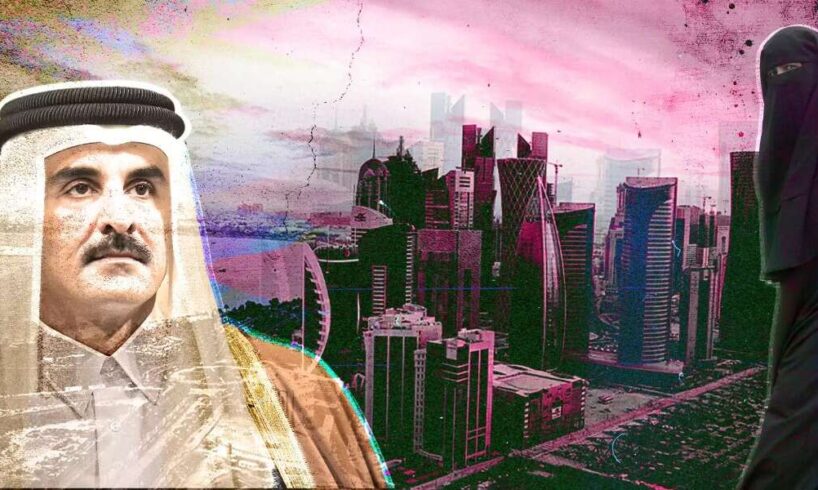
Persecution of minorities, encouragement of IDF soldier kidnappings, support for terrorism, oppression of women, and a legal system that enables modern slavery – all this “goodness” and more can be found in Qatar. It’s hard to think of another country in the world where such a large gap exists between declarations about human rights and the actual human rights situation. In the Gulf emirate, headed by ruler Tamim bin Hamad Al Thani, they know how to talk endlessly about the importance of international law, and occasionally, the capital Doha even hosts human rights conferences on behalf of UN organizations. But what about the situation at home?
Minorities: Endless harassment
One answer to this question is provided by a recent ruling in Qatar’s court, which decided to send the chairman of the Bahai community assembly in the country, Remy Rouhani, to five years in prison. The reason: The 71-year-old Rouhani simply dared to express himself and voice his opinions on equality between men and women. Consequently, the Bahai religious leader was accused of promoting “a doctrine or ideology that casts doubt on the foundations of Islam,” according to a section in Qatar’s penal code. The authorities accused him of “violating social principles and values through information technology,” as well as disseminating material promoting the adoption of “destructive principles.”
A fair trial? Not in this country. The representative of the international Bahai community at the UN, Saba Haddad, warned that Rouhani was imprisoned on a series of baseless charges, relying solely on his religious identity. She added that the attack on him is an attack on all Bahais in Qatar – and on the very principle of freedom of conscience.
Rouhani, it should be noted, is a Qatari citizen and is regarded as a prominent businessman. He previously served as CEO of the Chamber of Commerce and Industry in the country. His daughter, Nora, told the BBC Arabic network that his activities had been conducted transparently and encountered no significant opposition in recent years. Despite this, in December 2024, he was sentenced to one month of suspended imprisonment, along with a fine of approximately $50,000, for “collecting funds without regulatory approval for charitable activity.”
The Ministry of International Communications in Qatar published a response to the publications on the subject, which attempted to portray the story in a completely different light. It stated, among other things, that “Qatar’s constitution guarantees the right to freedom of worship for all, and this right must be exercised in accordance with the law. It must not threaten or harm public stability or security. Qatar’s judicial system guarantees to provide all parties in any issue a fair legal process.”
President Donald Trump and Qatar’s Emir Sheikh Tamim bin Hamad Al Thani gesture as they participate in a state dinner at the Lusail Palace, in Doha, Qatar, Wednesday, May 14, 2025 (Photo: AP /Alex Brandon) AP
Really a fair process? The charges against Rouhani were based on social media posts dealing with justice and equality between men and women, respecting parents, and a general call for good deeds – not exactly “radical” ideas. The authorities, for their part, claimed he “violated public order,” arrested him in April this year, and held him in detention until his trial. Despite the Qatari announcement, according to human rights organizations, he did not receive legal assistance from a lawyer.
In an interview with her, Rouhani’s daughter added details about the terrible treatment the family has faced for years. She herself now lives in exile in Australia with her husband and daughter, after being forced to leave Qatar following the inclusion of her Iranian husband, a member of the Bahai faith, on a “blacklist,” without explanation from the authorities. This step prevented him from entering the country’s territory or residing in it – part of the systematic discrimination, according to Nora, that Bahais in Qatar endure.
“I am Qatari and received my education in Doha’s schools and universities. We didn’t come from another planet. But because of our Bahai faith, we became strangers in our homeland,” she said painfully. Indeed, human rights organizations report many manifestations of discrimination against Bahais by the authorities in Qatar, including deportations, arrests, and even deliberate bureaucratic delays, such as delays in granting permits to rebuild a cemetery.
Foreign workers or foreign slaves? “Forbidden to leave the employer”
This is not the only group discriminated against in Qatar. Many of the emirate’s residents are foreign workers without rights, who are in the status of de facto slaves. Take, for example, Amit Gupta, a senior technology professional from India, on charges that remained classified. For months, his family was not even updated on what crime he was accused of. Gupta is the head of an Indian technology company operating in Kuwait and Qatar, and in 2013, he moved to work in Doha. In early January, he was arrested by Qatar’s security apparatus while sitting in a restaurant, without being told the reason for the arrest.
In Qatar, it should be emphasized, hundreds of thousands of Indians like Gupta work. Last year, the country’s court released eight former Indian Navy officers after they were sentenced to death. According to foreign reports, they were accused of “spying for Israel.”
According to Human Rights Watch, more than 91 percent of Qatar’s population are foreign workers. These are controlled by an abusive sponsorship system (according to the “kafala,” the guarantee system practiced in many Arab countries), which gives employers almost complete control over workers. Despite publicized initiatives to improve their situation, workers still struggle to change jobs – even if employers have stopped paying them. Not only that, but when a worker leaves his workplace without employer permission, it is considered an “escape” that is considered a crime under the country’s law. This is probably also the reason why to this day Qatar has not opened an investigation regarding the deaths of masses of foreign workers – between hundreds to thousands, according to estimates – as part of the 2022 World Cup.
Discrimination against women: Raped and sent to prison
The status of women in Qatar is no better – unless they are members of the emir’s family. Women are subject to guardianship laws that prevent them from making any significant decisions about their future. For example, they can only marry if their guardian, a male family member, approves of it. Men, by comparison, can marry up to four women simultaneously, without needing anyone’s approval. Additionally, women are required to obey their husbands and may lose the right to alimony if they refuse to have sex with their husband “without a justified reason.” Working outside the home also requires permission from the guardian.
Her Highness Sheikha Moza bint Nasser appears onstage at the Fashion Trust Arabia Prize Gala on November 3, 2021 at the National Museum of Qatar in Doha (Photo: Craig Barritt/Getty Images for Qatar Museums ) Getty Images for Qatar Museums
Beyond that, Qatar’s penal code prohibits sex outside of marriage. Anyone who violates the law could be sent to up to seven years in prison. A Muslim who does so could receive flogging if unmarried, and if he has consensual relations with an unmarried woman – the death penalty.
This law affects the authorities’ treatment of rape crimes. For example, a few years ago, a tourist from the Netherlands was drugged and raped in a nightclub in Doha. When she complained to the local police, she was sent to prison for several months and fined $800 before being deported from the country.
LGBT community: Set a date on Grindr – and got arrested
The situation of the LGBT community in the country is particularly severe. Just last year, Qatar’s security apparatus arrested Guerrero Avinia, a foreign citizen who lived in the country for seven years and worked at an airline company, shortly after he agreed to meet with a man through the Grindr app. His family told human rights organizations that they believe the profile he contacted was fake and was operated by the police.
Over the years, there have been reports of other arbitrary arrests of lesbians, gay men, and other LGBT community members. Qatar is one of 64 countries where homosexuality is prohibited by law. According to various reports, Nepalese were imprisoned in Qatar solely because of their sexual orientation, a move that caused the country to warn its citizens about working in countries like Qatar.
And of course, alongside the systematic violation of human rights, there is the sour cherry on the Qatari whipped cream: support for Hamas and attacks against Israeli targets. During the war, Education Minister Lula al-Khater praised senior Hamas officials and terrorists who were eliminated, including Mohammed Deif and Yahya Sinwar; and this week, after the attack on IDF forces in Khan Yunis, journalist Jaber al-Harami – close to the government – published a post expressing a wish that Hamas would kidnap soldiers; he later deleted it.
The absurdity is that Qatar continues to conduct a foreign policy in parallel, in which it purports to portray itself as a champion of human rights. In 2022, Qatar’s ambassador Hind al-Muftah even ran for the position of chair of the UN Forum for Human Rights, Democracy and Rule of Law; until, at the last moment, the organization UN WATCH exposed a series of statements by the celebrated diplomat, who described Jews as “our enemies” and homosexuals as “repulsive.”
The organization noted at the time that Qatar has significant influence on the UN in Geneva, and as part of this, the country funded a hall in its name worth $20 million. And this, in essence, tells the whole story: behind the big money and self-glorification, lies corruption that is no less substantial.





